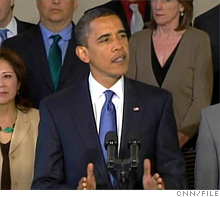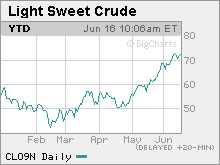Obama vs. the oil bubble
A financial regulatory overhaul could reduce huge swings in the price of crude oil and gasoline.
 |
| How hard will President Obama's administration push to change energy derivatives markets? |
 |
| Crude prices have bounced off their lows, reviving last year's bubble talk. |
NEW YORK (Fortune) -- Can reinvigorated financial watchdogs take a bite out of surging oil prices?
President Obama is scheduled to outline a regulatory reform program Wednesday that will, among other things, call for strong federal oversight of derivatives -- side bets on changes in asset values or interest rates.
The reform push is being driven by the past year's financial-system tremors, which were intensified by derivatives such as credit default swaps, or wagers on a bond issuer's health. The administration aims to defang that demon by moving derivatives trading out of the shadows to reduce uncertainty.
But this year's surge in the price of oil is turning Washington's attention back to another derivatives debate: whether speculation in the futures markets is responsible for wild swings in the prices for crude oil and other commodities.
Crude oil recently fetched around $70 a barrel, more than double its December lows.
The run-up has been taken in some quarters as a sign of the revival of global demand.
But the price surge has raised eyebrows because it comes at a time when economies around the globe remain weak. In the United States, oil supplies are at two-decade highs while demand is at a 10-year low.
Some observers blame the price rise on investment funds plowing money into commodity futures contracts.
"What we're seeing is the assetization of commodities," said Dan Dicker, a longtime oil trader on the New York Mercantile Exchange who is writing a book about the phenomenon. "This isn't a nefarious group at work, but the oil market is following stocks almost in lockstep now."
Not everyone agrees that investors are so innocent. The concept got an airing last year, as oil headed toward its all-time high at $147 a barrel, after hedge fund manager Michael Masters testified before Congress on the role of these funds -- which he dubbed index speculators.
Masters testified again earlier this month before the Senate Agriculture committee. He called for regulators to impose limits on futures-contract purchases by those not involved in the physical production or consumption of commodities. Any substantive changes in regulation will need congressional action.
That's a change that Obama's top commodities regulator, Gary Gensler of the Commodities and Futures Trading Commission, seems to embrace. The goal: insulate commodity producers and consumers from the influence of investors who are betting on rising prices.
"I intend to pay particular attention to using current authorities and obtaining much needed new ones, including aggregate position limit authority, to protect farmers, merchants, consumers, and small businesses from the burdens of excessive speculation," Gensler said last month at his swearing-in ceremony.
But Scott Irwin, an agricultural economist at the University of Illinois, says there is little evidence to support the notion that index fund buying is playing a substantial role in the level of commodity prices.
"The academic work to date finds no evidence that the massive runup of commodity prices can be traced to the index funds," he said.
Irwin said a recent study of dynamics in the corn market, where prices spiked last year as well, shows that the rise in futures buying by index funds and other long hedgers was met with increased selling by large commercial interests -- the entities that these markets were created to serve.
Irwin adds that were the administration to expand CFTC control of position limits to all commodities, the "costs would far outweigh the benefits." He proposes instead that regulators eliminate position limits except during delivery periods, when the markets are vulnerable to manipulative trading.
Whatever is behind higher oil prices, it's easy to see how they could impede an economic recovery -- a turn of events that could draw much interest in Washington.
Sen. Bernie Sanders, I-Vt., this month introduced legislation to force the CFTC to invoke emergency powers to stop speculation, saying Wall Street was being allowed to "jack up oil prices through price manipulation and outright fraud."
Dicker said that should oil prices continue to rise, the drumbeat for action will continue to get louder. He said he could even envision regulators forcing all futures traders to liquidate their contracts when they expire, rather than rolling them over into the next month -- which is how regulators responded when the Hunt brothers tried to corner the silver market 30 years ago.
"If the screaming gets loud enough," he said, "you could see some pretty draconian measures." ![]()
-
 The retail giant tops the Fortune 500 for the second year in a row. Who else made the list? More
The retail giant tops the Fortune 500 for the second year in a row. Who else made the list? More -
 This group of companies is all about social networking to connect with their customers. More
This group of companies is all about social networking to connect with their customers. More -
 The fight over the cholesterol medication is keeping a generic version from hitting the market. More
The fight over the cholesterol medication is keeping a generic version from hitting the market. More -
 Bin Laden may be dead, but the terrorist group he led doesn't need his money. More
Bin Laden may be dead, but the terrorist group he led doesn't need his money. More -
 U.S. real estate might be a mess, but in other parts of the world, home prices are jumping. More
U.S. real estate might be a mess, but in other parts of the world, home prices are jumping. More -
 Libya's output is a fraction of global production, but it's crucial to the nation's economy. More
Libya's output is a fraction of global production, but it's crucial to the nation's economy. More -
 Once rates start to rise, things could get ugly fast for our neighbors to the north. More
Once rates start to rise, things could get ugly fast for our neighbors to the north. More







